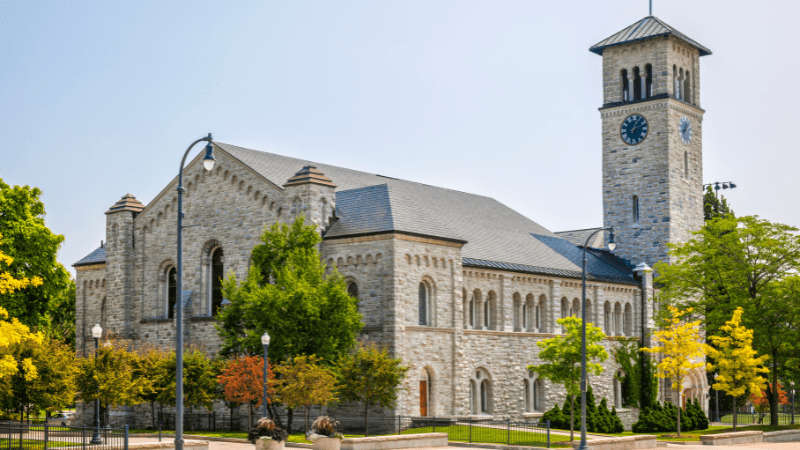This article originally appeared in the Globe and Mail.
By Ken Coates, February 1, 2024
Queen’s University is in a tizzy and a fiscal mess. The institution faces a substantial deficit and is now coping with internal turmoil over the administration’s strategies for financial stabilization.
To add fuel to the fire: The federal government’s reduction in international student visas and work permits has eliminated Ontario’s postsecondary fiscal safety valve. To some observers, the Queen’s boat is sinking, and the government has thrown the only reliable bailing bucket overboard.
This is a shame. Queen’s is a fine institution, with a stellar reputation. Despite being viewed as a party school by some students, it is one of the few Canadian institutions with a national reach, international academic standing and a long-standing commitment to a liberal arts education. It also has one of the country’s most sought-after commerce programs. But now, the fate of many of its offerings is up in the air – even the university’s highly respected public administration program is contemplating suspending admissions.
University finances are complicated and curiously insensitive to fiscal realities. The troubles of Queen’s reflect how Ontario universities have faced a double financial whammy and a single solution.
The first problem is that costs are high. Tenure-track faculty members have first-rate job security, and the absence of mandatory retirement means many highly paid professionals keep working well after 65 years of age, adding to the already considerable burden of faculty salaries.
The second problem is that revenue is low. The provincial government has frozen tuition fees – a vote-buying exercise of surprisingly little impact on access for less wealthy students – and provides the lowest per-student grants in the country.
The “solution,” which worked for many Ontario postsecondary institutions, was an extremely aggressive approach to international student recruitment, with these high-fee-paying students providing two-thirds of the tuition revenue in the province. Queen’s dined at that table less enthusiastically than any other schools, but international fees nonetheless produced more than 30 per cent of the university’s revenue.
Queen’s financial crisis is not unique. Laurentian University faced an even greater plight and endured massive cutbacks in faculty positions and programs. Campuses across the country regularly face discussions of structural deficits and imminent reductions in faculty and staff positions.
Montreal’s McGill and Concordia currently face the government-induced challenge of a major increase in tuition and additional measures that make these fine universities, based in Canada’s most interesting city, unappealing to new applicants. The University of Alberta faced gut-wrenching reductions in funding in recent years, necessitating extremely tough cuts.
At the heart of the issue is that, for too long, universities have rarely made tough financial decisions efficiently or effectively. Faculty salaries are locked in, and, as Laurentian discovered, laying off faculty members is public, controversial and painful. Universities developed programs over decades and, unlike colleges and polytechnics, cannot pivot quickly and reallocate funding from low-enrolment to high-demand courses. Shutting foreign languages and adding more seats in business is a potential long-term solution, not a short-term fix.
Most administrations take non-confrontational approaches, delaying the filling of vacant positions rather than closing departments; cancelling small classes instead of shuttering popular athletic teams; launching emergency fundraising appeals instead of reorganizing departments; reducing senior administrative salaries symbolically rather than eliminating the university’s equity, diversity and inclusion office.
Public discussion of the Queen’s situation currently focuses on cutting classes with few students. That buys small savings while robbing the campus of the small-class experiences that make institutions like Queen’s attractive to top students. In the 1970s, upper-division classes were, by design, typically small, providing high-quality capstone intellectual experiences. They will soon be gone. Expensive undergraduate programs and highly specialized graduate programs may find themselves on the chopping block.
Universities, and not just Queen’s, should note that there is precious little appetite for immediate provincial government assistance. The public does not feel the pain of Queen’s and other public universities. Almost no one is clamouring for expensive bailouts. A few years ago, universities were seen as crucial to Canada’s economic survival. Now, they are on their own.
Queen’s and other universities cannot delay the hard work. Addressing the financial burden of older faculty members is crucial. So is an examination of the many services and specialized administrative offices; some will have to be cut. Tuition fees must rise, with money set aside for bursaries for those unable to pay. Ancillary fees – parking, student housing, food services – will rise, perhaps dramatically. University buildings must be used more effectively. The toughest bullet – controversial to the core – requires an examination of faculty salaries, one of the few places where real long-term savings are possible.
Canadian universities are in trouble. Politicians do not make them a high priority. Students are piling into academic programs that promise high career earnings, leaving the traditional academic core vulnerable. Queen’s University is not the first to face a serious financial crisis. It will not be the last.
Ken Coates is a distinguished fellow and director of Indigenous affairs at the Macdonald-Laurier Institute and a professor of Indigenous governance at Yukon University.






